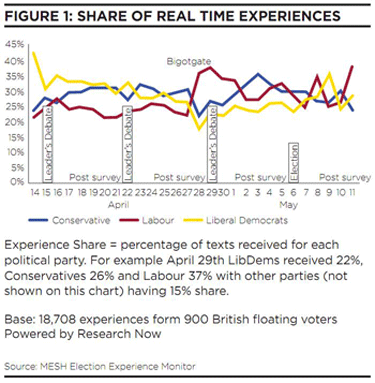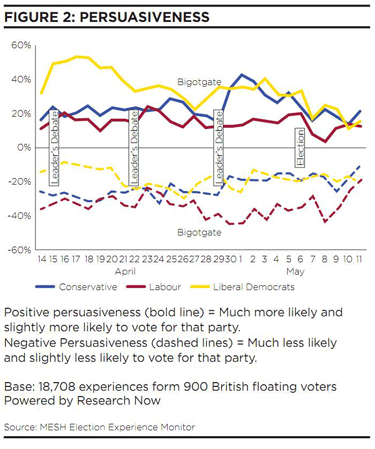Fiona Blades, Paul Baines and Emma MacDonald
First published in Research World July/August 2010
Tracking experiential touch-points in the UK General Election
If you were a political party trying to measure the effectiveness of your marketing, faced with the option of tracking experiences or tracking vote share, which would you prefer? Traditional polls don’t get under the skin of which experiences impact on voting decisions. Experience tracking digs deeper.
We applied our experience tracker, Touchpoints Return on Investment (TROI), to the British General Election for the very first time. The ‘MESH Election Experience Monitor’ tracked experiences of between 900-1,100 floating voters using Research Now’s panel from 13 April to 11 May. Every time a participant came into contact with a political party they texted us the party (A for Labour, B for Conservative etc), the touchpoint (A leaders’ debate, B conversation, C poster, etc), how it made them feel and how likely the experience made them to vote for that party. We captured in real-time every experience they had; from reactions to the leaders’ debates to leaflets on the doormat and conversations with colleagues.
Each text went into the participants’ online diary for comments and to upload photos. Overall, we received 18,708 texts and 14,776 comments.
Before texting, floating voters completed an online survey to identify voting intentions, issues of importance and perceptions of political parties and the main party leaders. Each week, participants answered these questions again, so we could see how their views had changed.
What did we unearth?
Experience tracking allows us to see which party had the largest share of experiences (Figure 1). Because participants text when they come into contact with a political party, they choose when to text. The experience share gives a sense of share of mind or share of voice for each of the main parties.
We saw the Liberal Democratss start strongly in terms of share of experiences following the first leaders’ debate on 15 April, but they trailed off towards the end of the campaign. Labour’s share of texts leapt up on 18 April prompted by ‘Bigotgate’, when Gordon Brown referred to a voter as a bigot in an unguarded moment (largely negative experiences).
Figure 2 shows the damage Bigotgate caused as experiences people had with Labour persuaded them not to vote for the party. But Experience Tracking wasn’t just picking this up as it was happening, we could also see that women were having more conversations about Gordon’s gaffe. Phrases like ‘two-faced’, ‘bully’ and ‘showing his true colours’ shone through. The share of experiences for Conservatives picked up over the weekend before the election (and were mainly positive).
Now, we all know that this campaign didn’t witness the Obama-like online revolution predicted for it, but which channels dominated? Online received only 3% of experiences, and traditional channels won the day. TV news was consistently the largest experience at around a quarter of experiences in the first three weeks, reaching a peak of 41% experiences in Week 4, before and after the election. The leaders’ debate had the number 2 spot with 16% of experiences in Week 1 and 13% for both Weeks 2 and 3.
Local ‘touchpoints’ gathered momentum with leaflets leaping from 7% to 12% of experiences in Weeks 1 to 2 and posters rose from 8% to 11% in Weeks 2 to 3. By week 3, three quarters of posters were those for local party candidates, put up in gardens and front windows.
Buzz – word of mouth – was highest in Week 1, after the leaders’ debate and Week 4, around the election itself (both at 6%).
Impact of experiences on voting intentions
However, quantity isn’t everything. Figure 2 shows the persuasiveness of the experiences. The first leaders’ debate had an amazing impact for the Liberal Democrats. Nick Clegg’s strong performance created a halo effect across all ‘touchpoints’ from conversation to leaflets.
“Discussion centred on TV debate and the fact that LibDems had won it according to polls – everyone felt that Clegg was a man of substance and that the Lib Dems might just beat Labour, made me think seriously about my previous plan to vote tactically instead of for the party I think can offer most.” (LibDems, conversation, very positive, slightly more likely to vote)
In fact, when answering their weekly online survey, we saw our floating voters going from 19% saying that they would vote Liberal Democrat before they started texting, to 39% at the end of Week 1.
The third leaders’ debate also had an important effect, revealing the power of the news media. Net persuasiveness for the Conservatives in the final leaders’ debate on April 28th was -14%. However, the next day the media channels were billing this as a David Cameron ‘win’.
“Feature on the TV debate and how strongly David Cameron performed. The feature was very positive for Conservative and made me feel more positive about him and the party.” (Conservatives, newspaper news, fairly positive, slightly more likely to vote)
This explains the Conservatives having the most persuasive experiences from April 30th to May 2nd. As for Liberal Democrats after the first debate and the media response to it, we see a herd response as people gained confidence from what other people were saying and doing. Our floating voters went from claiming that Conservative ‘touchpoints’ were generally turning them off voting Conservative to generally persuading them to vote Conservative.
We saw this effect locally too. Participants claimed that 75% of poster experiences in Week 3 were making no difference to voting intention. However, comments in diaries revealed another story as people gained confidence from other’s behaviour.
“Saw [the poster] in my neighbour’s window (who I thought was staunch Conservative). Made me feel more positive re voting LibDem” (LibDem, poster, very positive, made no difference)
Paid for media campaigns?
Conservatives started in a good position, with 26% of floating voters claiming they would vote for them, but their poster campaign, featuring a grimacing Gordon Brown completely misjudged the mood of the nation. 16% of Conservative poster experiences were persuading floating voters to vote Conservative in Week 1, but 28% of experiences were persuading them not to vote Conservative. One participant, with a poster right outside their house, described it as ‘positively Orwellian’. Unfortunately posters were the 2nd largest ‘touchpoint’ for Conservatives in this first week. Not surprisingly voting intention dropped to 22%.
Following the election the buzz was mainly positive. There were mixed reactions to the idea of electoral reform, but floating voters did appear generally optimistic.
“The conversation turned to the general election and particularly the role of the Liberal Democrats. We discussed the impact that the Liberal Democrats were having on the election and how positive this made us feel that skills from all parties may be used in a hung parliament.” (LibDems, conversation, fairly positive, slightly more likely to vote LibDem?)
The next step is to analyse which ‘touchpoints’ impacted on actual voting behaviour by looking at those experiences that drove through changes in voting behaviour using the online survey data in conjunction with the texts. This analysis will give us:
- The relative impact of media coverage versus party initiated communications.
- Which ‘touchpoints‘ impacted on perceptions of parties and party leaders most deeply.
- Including, the impact of local communications on national parties.
The richness available from experience data captured in real-time is evident in these unique insights obtained from floating voters’ experiences during the month surrounding the UK election. However, we’ve only just skimmed the surface; doubtless deeper analysis will provide a clearer picture of the turning points in this campaign where individual experiences contributed to the UK population’s decision to vote for their first hung parliament in almost four decades.
Fiona Blades Founder and CEO, MESH Planning, Dr Paul Baines is a Reader in Marketing and Dr. Emma MacDonald is senior research fellow with Cranfield School of Management.


